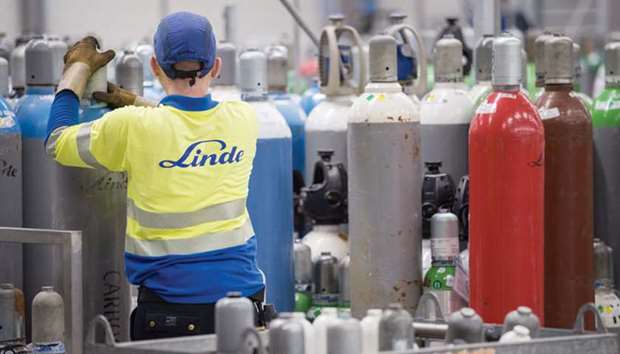Linde AG is considering the sale of additional assets in the US that would mark a near-complete retreat from its existing industrial gas operations in the country and a last-ditch attempt to salvage its $47bn merger with Praxair Inc, according to people familiar with matter.
The decision to dispose of the onsite and speciality gas businesses hasn’t been finalised and would still need approval from Linde’s supervisory board, said the people, who asked not to be named as the deliberations are private. CVC Capital Partners and Messer Group GmbH would be willing to buy the assets, one of the people said.
Linde has already agreed to sell a $3.3bn package of North American assets — including Linde’s US bulk business — to CVC and Messer. The additional businesses to be sold include plants built at oil refineries to supply hydrogen to make low-sulphur fuel. The merged entity would still have Praxair assets in the US.
A spokesman for Linde declined to comment as did a representative of CVC. Praxair spokeswoman Lisa Esneault didn’t respond to a request for comment and Messer wasn’t immediately available.
The move to put even more businesses up for sale comes as the suppliers of gases like oxygen and nitrogen for factories and hospitals attempt to salvage a deal that has been at least two years in the making and now faces the prospect of collapse. The companies were caught off guard by a notice from the Federal Trade Commission in the US to sell more assets in order to gain antitrust approval even after they had already agreed to roughly $9bn worth of disposals in Europe and North America.
Linde’s warning on Sunday that the FTC request has resulted in a “higher probability” that asset sales will exceed a limit set by the companies sent their shares tumbling on Monday. The German and US suppliers were already under pressure to meet an October 24 deadline for approvals for the deal.
The shares pared declines after the Bloomberg report, trading 7.5% lower at €194.50 at the close in Frankfurt. Praxair’s stock fell 3.8% to $157.96 at the close in New York.
As part of their agreement to combine, the companies set limits on the assets they would be willing to jettison in return for regulatory clearance. Under their deal, the units to be sold must have annual sales of less than €3.7bn ($4.3bn) or income before interest, taxes, depreciation and amortisation of less than €1.1bn. The latest requests from US regulators are “more onerous than previously expected,” said Linde, which generates about 23% of its revenue in the country.
Before the FTC request, the companies reached agreements to shed assets. Last month, Linde announced the sale of North American businesses with combined 2017 revenue of about $1.7bn that included Linde’s US bulk business and operations in Brazil, Canada and Colombia. A little more than a week earlier, Linde and Praxair agreed to sell a raft of industrial-gas plants in Europe to a Japanese competitor. They indicated at the time that additional sales may be necessary to get final approval from regulators.
Linde’s US onsite business generates about €1bn of sales and is probably the new point of contention with the FTC, JPMorgan analyst Jeffrey Zekauskas said in a note. Selling the entire division would put total planned divestitures at or above the deal limit, but that’s a “low” probability, he said. Rather, a portion of the unit is likely to be sold, he said.
“The transaction continues to have a good chance of being completed,” Zekauskas said in the note.
The companies have already faced a rough ride during a European antitrust review of their deal, which would see the merged entity bear the Linde name and be listed in New York and Frankfurt. They agreed to sell the European assets to Taiyo Nippon Sanso Corp.
Under terms of the tie up, Praxair chief executive officer Steve Angel and Linde chairman Wolfgang Reitzle will keep their titles and the board and management will come from each of the companies. The new holding company will be incorporated in Ireland and board meetings will be mostly be held in the UK, Linde has said. Corporate functions will be split between Munich and Danbury, Connecticut, where Praxair is based.

A worker manoeuvres an empty canister inside the Linde AG compressed gas plant in Marl, Germany. The decision to dispose of the onsite and speciality gas businesses hasn’t been finalised and would still need approval from Linde’s supervisory board, sources said.
